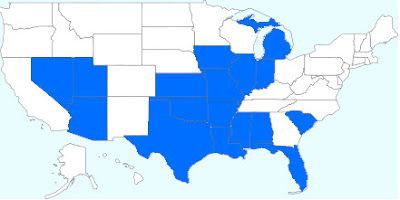Last Tuesday night, I needed to make a quick run to Walgreens to pick up some child's pain reliever for our daughter. I went to pay with my debit card but it was declined. I furrowed my brow and said "Well, that's not right. Let's try it again." This received the same result as the first attempt, so I conceded and paid with my credit card.
Back in the car, I checked my account with my phone and found some rather interesting charges on our account. There were a total of $900 worth of charges made just outside Chicago on the Indiana side at Walgreens (ironically), Family Dollar, and a Dunkin Donuts. Evidently, my debit card information had found its way into the wrong hands. Like, seriously, some really wrong hands. Who spends $900 at Walgreens, Family Dollar, and Dunkin Donuts?
I called and had both mine and Jodi's cards cancelled. The next day, I went to my bank and they very quickly credited me back all the charges without a fuss. One more reason that I highly recommend Great Southern Bank. They've always been great to deal with and a welcome change from 12 years at Bank of America.
I was very fortunate and feel blessed to have had this happen when it did rather than some other time. I had just paid several bills and had all those transactions go through without anything left pending when the thieves made the charges. Had there been things pending, charges would have accumulated. And, while Great Southern would have credited me back any fees that they charged, they wouldn't have been able to do anything about the fees that resulted on any other company's end such as returned check fees, late fees, etc. But, like I said, nothing like that happened so it turned out to be a pretty easy fix. Much more than I can say for most people who have to deal with these sorts of things.
Just after the event, we got a notice from the back that Mastercard had informed the bank that a lot of cards were compromised due to a digital security breach at some company. One thing that I have learned from this is that it's important to check your account daily. With debit cards, time is of the essence. There are laws to protect the owner of the account, however, there are also time requirements on the disputing of charges. So, a daily reviewing of your checking account is pretty important.
Back in the car, I checked my account with my phone and found some rather interesting charges on our account. There were a total of $900 worth of charges made just outside Chicago on the Indiana side at Walgreens (ironically), Family Dollar, and a Dunkin Donuts. Evidently, my debit card information had found its way into the wrong hands. Like, seriously, some really wrong hands. Who spends $900 at Walgreens, Family Dollar, and Dunkin Donuts?
I called and had both mine and Jodi's cards cancelled. The next day, I went to my bank and they very quickly credited me back all the charges without a fuss. One more reason that I highly recommend Great Southern Bank. They've always been great to deal with and a welcome change from 12 years at Bank of America.
I was very fortunate and feel blessed to have had this happen when it did rather than some other time. I had just paid several bills and had all those transactions go through without anything left pending when the thieves made the charges. Had there been things pending, charges would have accumulated. And, while Great Southern would have credited me back any fees that they charged, they wouldn't have been able to do anything about the fees that resulted on any other company's end such as returned check fees, late fees, etc. But, like I said, nothing like that happened so it turned out to be a pretty easy fix. Much more than I can say for most people who have to deal with these sorts of things.
Just after the event, we got a notice from the back that Mastercard had informed the bank that a lot of cards were compromised due to a digital security breach at some company. One thing that I have learned from this is that it's important to check your account daily. With debit cards, time is of the essence. There are laws to protect the owner of the account, however, there are also time requirements on the disputing of charges. So, a daily reviewing of your checking account is pretty important.




















